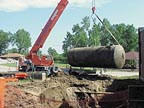
When underground contamination hits fractured bedrock, it can be maddening to predict its movement through the random cracks and fissures - making this one of the most difficult types of geology to clean up. In fractured rock sites around the United States, ground water contamination comes from a variety of sources including Superfund sites, large scale military installations, individual gasoline stations and dry cleaners to name a few.
Scientists love a good challenge, however, and some of the world's foremost authorities on the subject will gather Sept. 13-15 in Portland, Maine, to tackle how to detect, monitor and clean up contamination in fractured rock. The Fractured Rock Conference: State of the Science and Measuring Success in Remediation is sponsored by the National Ground Water Association (NGWA) and the U.S. Environmental Protection Agency (EPA).
“It's elusive to monitor contaminants in fractured rock. Some say once it gets into the rock, we'll never get it out,” says Robert Masters of NGWA. “We don't believe this is always the case, and the goal of this conference is to advance the efficiency of remediation of ground water at fractured rock sites.”
The conference will bring together what might seem strange bedfellows: the environmental community and experts from the petroleum industry. “The environmental community is interested in getting oil and other pollutants out of the ground. The petroleum industry focuses on getting oil stored in the ground. There's much common ground when it comes to applicable research and engineering,” Masters explains. “If we just shared the existing technology, it would be a major step toward more effective remediation.”
The conference will focus on two major areas: characterization, or describing and monitoring contamination; and remediation, or cleaning up contamination. Scientists and engineers from 10 nations will be presenting papers at the conference, which will be managed by Rich Steimle of the EPA and Masters of NGWA.
To find out more about the conference, e-mail customerservice@ngwa.org or call NGWA at 800-551-7379. You also can visit www.ngwa.org.
ND

Report Abusive Comment